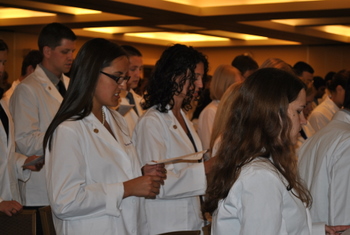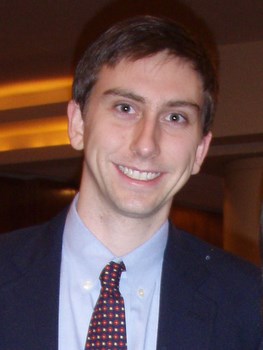Third-Year Medical Students Accept New White Coats in Transition to Clerkship
 |
| At the ceremony, medical students were given new white coats symbolizing a new beginning — the start of their two-year clerkship, a period where they will work directly with patients and learn alongside trained clinicians. |
Northwestern University Feinberg School of Medicine held an Introduction to Clinical Clerkship White Coat Ceremony on July 2 to mark an important transition for third-year students who are progressing from classroom- to practice-based education. Moving forward, the Class of 2012 will spend the majority of their time learning in clinical settings, applying their skills by administering care to real patients.
“I have all of the knowledge and tools to succeed, but am entering this black box containing the unknown,” said third-year medical student Silviu Diaconu of his obstetrics and gynecology clerkship beginning next week. “My future decisions and actions will impact a real person; it’s a little unnerving.”
John X. Thomas, Jr., PhD, senior associate dean for medical education, welcomed students, parents, and fellow faculty to the event. Thomas acknowledged the students’ nervous anticipation, but assured them that they are well-prepared for the road ahead, saying, “I have watched you each progress over the past two years, and my hat’s off to you.”
While commemorating a significant milestone in the students’ medical education, the event also served as the venue for presenting numerous honors — awards given to faculty who made an exceptional impact on the students.
First up, Class of 2012 student Nitin Yerram presented the George H. Joost Award for Teaching Excellence in the Scientific Basis of Medicine (SBM) to Sanjiv Shah, MD, assistant professor of medicine in the Feinberg Division of Cardiology, saying that Shah hypnotized his fellow students into a world where cardiology made sense. Shah earned his Doctor of Medicine degree from Feinberg a decade ago, but insists he still remembers what it’s like to be in the students’ shoes.
“Medical school is a challenging time and there is a ton of knowledge to learn and digest,” he recalled. “It’s also an amazing time of transformation from being a student to becoming a practitioner. The third year is where you find the passion, when you live and breathe medicine at the bedside.”
Shah uses his relatable experience to help shape the medical education programs that prepare Feinberg students to be outstanding clinicians and future leaders in the healthcare field â working with fellow SBM lecturers to design the cardiovascular unit curriculum.
“Recognition from the medical students is a great feeling because it lets us know that we are on the right track; but there is always room to improve, refine, and get more creative with our program,” he says.
Student Terrance Lee presented the George H. Joost Award for Teaching Excellence in Patient, Physician, & Society to Kathy Neely, MD, assistant professor of clinical medicine in the Feinberg Division of Hospital Medicine, Section of Palliative Care/Hospice. A graduate of McGaw Medical Center of Northwestern University, Neely began planting her roots on the Chicago campus in 1982. While she certainly knows her way around the medical school, Neely recently went back to Feinberg to earn a Master of Arts in Medical Humanities and Bioethics — attending classes with many Class of 2012 students.
 |
| Medical students recited the Declaration of Geneva — renewing their promise to “maintain by all means in [their] power, the honor and the noble traditions of the medical profession.” |
“It’s been so exciting to be taught by the Feinberg faculty and get to know a few of the students as a fellow traveler,” she said.
In regards to her honor, Neely quoted famed educator, Mr. (Fred) Rogers:
“The two most important ingredients of education are knowing that we are valued, and being in the presence of people who want to share with us something of the world that they love.”
If receiving the Joost Award indicates that the Class of 2012 experiences this in her teaching, Neely said, she can imagine no greater recognition.
Presenting the Michael M. Ravitch Award for Teaching Excellence in Problem Based Learning, student Silviu Diaconu called honoree Robert Golden, MD, assistant professor of clinical medicine in the Feinberg Division of General Internal Medicine, “an amazing tutor.” Golden learned to teach practice-based learning from the award’s namesake, Dr. Ravitch, so the award was especially meaningful.
“For me, the fact that I have been recognized in this way is a tribute to him,” Golden said.
Golden, a faculty member at Feinberg since completing his internal medicine chief residency through McGaw in 1994, insists that the highlights of his career are teaching and especially mentoring.
He said, “I am certain that teaching has made me a better physician, and I have truly enjoyed the opportunity to work with such bright, inquisitive, and enthusiastic students.”
 |
| Feinberg faculty chose third-year medical student Sebastian Lara to read his essay, “Custom Tailored White.” |
Faculty chose one such enthusiastic student, Sebastian Lara, to recite an essay he had written called “Custom Tailored White.” Lara took listeners on a walk through his life and his interactions with people who all wear unique colored coats for distinct reasons. Lara then described their white coat, “a patchwork of camouflage to blend in among the other white coats and orange to make a statement to patients that we possess the training, knowledge, and compassion to administer their care…”
“The white coat is on our shoulders,” Lara said. “Let’s make these people proud.”
Following the distribution of awards, it was time for Raymond Curry, MD, dean for education, to invite students to outfit each other with a new white coat, this one featuring their name embroidered on the chest. The coat is symbolic of new beginnings — the start of their two-year clerkship, a period where they will work directly with patients and learn alongside trained clinicians.
To close the ceremony, Curry led students in a recitation of the Declaration of Geneva. By reading these words, also referred to as the Physician’s Oath, students renew their promise to “maintain by all means in [their] power, the honor and the noble traditions of the medical profession.”
“This is an important transition,” Curry said. “From this day forward, you will be doing the same type of work and gaining the same type of rewards that you will be for the remainder of your careers.”






